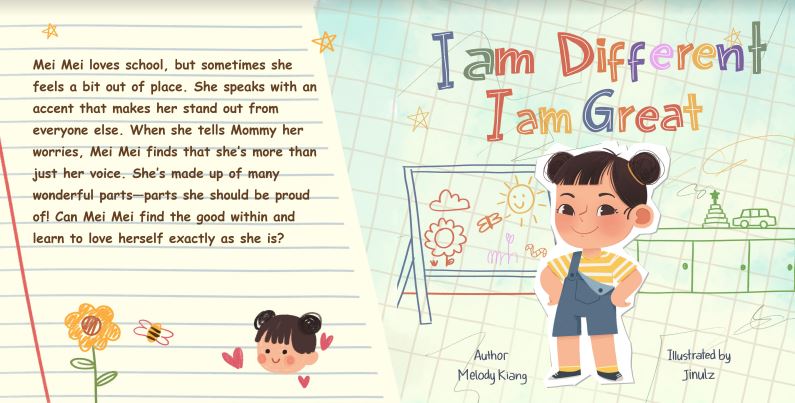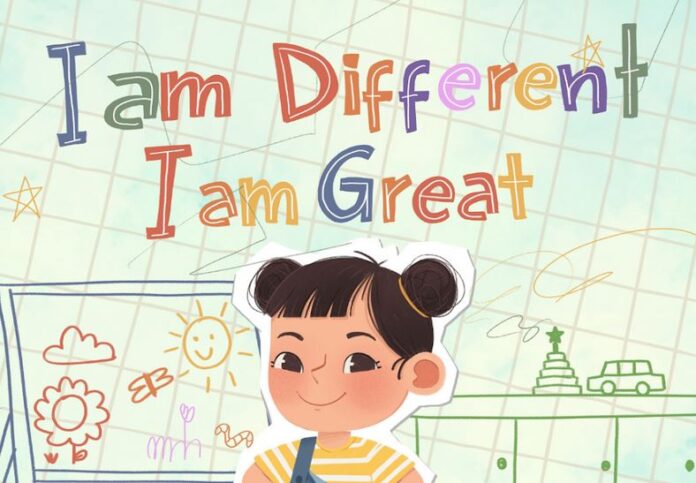By Ferry Baylon, AsAmNews Intern
In a vastly diverse world, everyone has an accent. However, immigrants tend to be singled out because of it. Melody Kiang is a second-generation Asian Canadian educator and author who struggled with this very issue.
Throughout the 32 pages of her self-published book, I Am Different, I Am Great, Kiang uses her personal experience to empower children to believe in themselves. Jinulz beautifully illustrates the book’s message of self-confidence and resilience.
Kiang wants her audience to embrace themselves and the qualities that make them different, ones that make them special.
Kiang’s own personal struggles with confidence and making friends mirror Mei Mei – the book’s protagonist. Kiang describes her passion project as “a story of diversity, self-discovery, and one young girl’s journey of triumph over insecurity.”
Kiang was born and raised in Canada to immigrant parents from Hong Kong and China. Her family moved from North America to Singapore when she was five. Kiang attended a local school and never felt out of place since everyone she interacted with spoke with a Singaporean accent, just like her. That was her “normal.”

After six years in Singapore, Kiang’s family moved back to Canada, where she started feeling a loss of confidence because of her Singaporean accent.
“That’s when children started to really make fun of me because they couldn’t understand what I was saying, and I couldn’t enunciate some of the words that I was trying to say,” Kiang said.
I Am Different, I Am Great is Kiang’s way of contributing to Asian American representation and diversity in books and, most importantly, making a difference.

During her elementary education, Kiang said teachers put her in ESL classes because of her accent, not her lack of language comprehension. “They also believed that I had some learning disability because they couldn’t understand me,” Kiang said.
While at school, Kiang worked with a speech therapist because her teachers believed she was a slow learner, given that she had an accent and spoke slowly compared to her classmates.
“I was trying to speak a little slowly so I could really pronounce what I was trying to say and to get them to understand,” Kiang said. “I was diagnosed with a learning disability when really, I didn’t have a learning disability.”
This misdiagnosis caused Kiang to feel even more insecure and embarrassed, which affected her relationships with her peers.
“In one part of the book, you see Mei Mei looking out the window, and her friends aren’t playing with her; it was actually the same memory that I had,” she said.
“My friends teased me and said, ‘Look, I can’t understand what you’re saying, sorry,’ and then they would run away from me. That actually made me feel really sad,” Kiang added.
Lia Pham, a business administration sophomore at California State University, Fullerton, said she faced a similar situation as Kang when she first moved to the United States.
“I arrived from Vietnam when I was eight, and it was a super hard transition speaking English all the time at school. I spoke with a very heavy accent, and I struggled talking to my teachers and classmates,” Pham said. She added that books, such as I Am Different, I Am Great was something she needed growing up to feel seen and heard.
“I wish a book like that was available to me during that time of my life. It could have helped with my self-confidence and made me not feel ashamed because I was different,” Pham said.
According to International Literacy Association (ILA), children should see a reflection of themselves in the books they read. Dr. Rudine Sims Bishop, professor emerita at Ohio State University, told ILA that through books, “children should also see and learn about those different from themselves.”
Kiang echoes this sentiment, and it is one of the biggest reasons she chose to write her book early this year. “It was a strong push to diversify Asian American stories, and this book is just one story out of a lot of many different experiences,” Kiang said.

Kiang reflected that growing up, she needed educators who encouraged her, but unfortunately, there were none.
“I really needed the support from teachers, and I didn’t get that. So that’s a big reason for why I became an educator – to support these children. To not have them be put in a box or defined by a learning disability,” she said.
Kiang is currently writing another book about her experience with cultural food in a school environment. Her second book is expected to be published by March 2023.
AsAmNews receives a small percentage of any purchase through the link above.
I Am Different, I Am Great is available on Amazon, Barnes & Noble, Indigo Books, Apple Books, and more.

AsAmNews is published by the non-profit, Asian American Media Inc.
We are currently funded by our readers and such charitable foundations as the Robert Wood Johnson Foundation, AARP, Report for America/GroundTruth Project & Koo and Patricia Yuen of the Yuen Foundation.’
Find additional content on Bluesky, Facebook, Instagram , Tiktok, X, and YouTube. Please consider interning, joining our staff, or submitting a story, or making a tax-deductible donation.
You can make your tax-deductible donations here via credit card, debit card, Apple Pay, Google Pay, PayPal and Venmo. Stock donations and donations via DAFs are also welcomed. Contact us at info @ asamnews dot com for more info.



